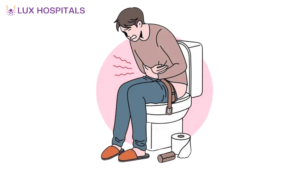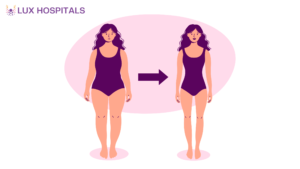Fissure vs. Fistula: Know the Difference

When it comes to issues in the anal region, two conditions often confuse: fissure vs. fistula. Although they both involve the same area, they are different in terms of causes, symptoms, and treatments. Understanding the fissure vs. fistula differences can help individuals seek the right care and avoid unnecessary discomfort.
In this blog, we’ll explore the difference between fissure and fistulas, their causes and symptoms, and how each is treated.
What is an Anal Fissure?
An anal fissure is a small tear or crack on the skin around the anus. These tears often occur when the skin is stretched too much during bowel movements, typically due to passing hard or large stools. People with an anal fissure may experience sharp pain during or after bowel movements, along with possible bleeding.
The pain from an anal fissure can be quite intense, sometimes making everyday activities, like sitting or walking, uncomfortable.
What is an Anal Fistula?
On the other hand, an anal fistula is a more complex condition in which there is an abnormal tunnel from the inside of the anal canal to the skin around the anus. Most fistulas are caused by an infection of the anal glands leading to an abscess.
The common symptoms of anal fistulas are persistent discharge, swelling, and discomfort near the anus. Others might also develop a fever. A fistula is different from a fissure because it is almost always a chronic condition that involves medical treatment.
Fissure vs. Fistula: Key Differences
The fissure vs. fistula debate comes down to the cause, symptoms, and treatment options. Let’s break down the difference between fissure and fistula:
| Aspect | Anal Fissure | Anal Fistula |
| Cause | Trauma to anal skin (hard stools, childbirth, etc.) | Infection in anal glands, abscess formation |
| Symptoms | Sharp pain during bowel movements, bleeding, itching | Persistent discharge, swelling, pain, fever |
| Location | Small tear in the anal skin | Abnormal tunnel between anal canal and skin |
| Pain | Intense pain during/after bowel movements | Pain or tenderness, especially with discharge |
| Treatment | Diet changes, topical creams, stool softeners, surgery | Surgery (fistulectomy), antibiotics, seton |
| Risk of Infection | Low | High, due to the presence of abscess |
Fissure vs Fistula Causes and Symptoms
Both fissure and fistula causes, and symptoms are distinct.
For anal fissures, the primary causes include:
- Passing hard or large stools
- Childbirth, which can cause trauma to the area
- Anal sex or other physical trauma
Common symptoms of an anal fissure include:
- Sharp pain during or after bowel movements
- Bleeding, which is usually noticed as blood on the toilet paper
- Itching and irritation around the anus
On the other hand, anal fistula causes include:
- Infection in the anal glands, leading to abscess formation
- Previous anal abscesses that have not healed properly
Common Symptoms of an anal fistula can be:
- Chronic leakage of pus or feces from the anus
- Swelling and redness around the anus
- Pain or tenderness in the anal area, mainly during a bowel movement
- Sometimes fever, if the fistula is infected
Fissure vs Fistula Treatment
Treatment of anal fissures is generally conservative, to alleviate pain and encourage healing. Here’s a breakdown of possible fissure and fistula treatment options:
Fissure Treatment
- Dietary Changes: Eating a high-fibre diet can help prevent constipation and ease the passage of stools.
- Topical Medications: Creams or ointments that promote healing and reduce spasms in the anal sphincter.
- Stool Softeners: To make bowel movements more manageable and less painful.
- Sitz Baths: Warm water baths that soothe the area and promote healing.
- Surgery: Surgery can be necessary in extreme circumstances to repair the rip and enhance anal sphincter function.
Fistula Treatment
- Antibiotics: To treat any underlying infection associated with the fistula.
- Surgery: Surgery is usually necessary to remove the fistula and close the abnormal tunnel. Depending on the type of fistula, different surgical techniques may be used.
- Setons: In certain cases, a seton (a piece of surgical thread) is used to help drain abscess and allow the fistula to heal over time.
- Fistulectomy: In which the fistula is surgically opened and cleaned to allow for proper healing.
Conclusion
Knowing the differences between fissure vs. fistula may change how you approach treatment and care. Both conditions are, of course, painful in the anal region. however, they arise from different causes, present different symptoms, and require distinct treatment options. If you find any signs or symptoms of anal fissures or anal fistulas, you should seek the advice of a medical expert without any further ado to not only avoid complications but also further improve your quality of life.
At Lux Hospitals, we provide the best fissure and fistula services with expert care, ensuring accurate diagnosis and effective treatment to help you recover quickly.
Frequently Asked Questions
A general practitioner, gastroenterologist, or colorectal surgeon can treat fissures and fistulas. Lux Hospitals provides the best treatment for these conditions with expert care.
A fissure causes sharp pain and bleeding during bowel movements, while a fistula leads to persistent discharge, swelling, and possible fever. Consult a doctor for a proper diagnosis.
A fissure typically does not turn into a fistula, but untreated chronic fissures may lead to infection, which could contribute to fistula formation.
No, they are different conditions. A fissure results from a tear in the skin, whereas a fistula develops due to an infection or abscess that forms an abnormal tunnel.
Mild fissures can heal with dietary changes and topical treatments. However, fistulas usually require medical intervention, often surgery, to prevent complications.
Constipation can cause fissures by straining during bowel movements. While it doesn’t directly cause fistulas, prolonged constipation may lead to infections that can contribute to fistula formation.
Bleeding is more common with fissures, especially during bowel movements. Fistulas may cause occasional bleeding but are more associated with pus discharge.





















